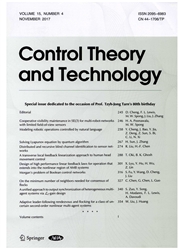

 中文摘要:
中文摘要:
由认为城市的下水道网络的流动控制最小化抽水站的电消费,为精力积蓄的分解协作策略在这篇论文基于网络社区分割被开发。描绘城市的下水道网络的稳态流的一个数学模型首先被构造,由有作为限制捕获的结构交通能力的一套代数学的方程组成。因为下水道网络没一般来说有明显的自然层次结构,识别聚类的组是很困难的。通过计算每个边的 between 海角的一条快网络部门途径成功地被使用与任意的配置识别这些组和一个下水道网络然后能被分解成子网。由集成子网的联合限制,原来的问题根据网络分解被分开成 N 优化潜水艇问题。每个潜水艇问题局部地被解决,潜水艇问题的答案被协调形成一个适当全球答案。最后,到一个指定大规模下水道网络的一个应用程序也被调查表明建议算法的有效性。
 英文摘要:
英文摘要:
By considering the flow control of urban sewer networks to minimize the electricity consumption of pumping stations, a decomposition-coordination strategy for energy savings based on network community division is developed in this paper. A mathematical model characterizing the steady-state flow of urban sewer networks is first constructed, consisting of a set of algebraic equations with the structure transportation capacities captured as constraints. Since the sewer networks have no apparent natural hierarchical structure in general, it is very difficult to identify the clustered groups. A fast network division approach through calculating the betweenness of each edge is successfully applied to identify the groups and a sewer network with arbitrary configuration could be then decomposed into subnetworks. By integrating the coupling constraints of the subnetworks, the original problem is separated into N optimization subproblems in accordance with the network decomposition. Each subproblem is solved locally and the solutions to the subproblems are coordinated to form an appropriate global solution. Finally, an application to a specified large-scale sewer network is also investigated to demonstrate the validity of the proposed algorithm.
 同期刊论文项目
同期刊论文项目
 同项目期刊论文
同项目期刊论文
 Stability of Boundary Feedback Control Based on Weighted Lyapunov Function in Networks of Open Chann
Stability of Boundary Feedback Control Based on Weighted Lyapunov Function in Networks of Open Chann Constrained feedback robust model predictive control for polytopic uncertain systems with time-delay
Constrained feedback robust model predictive control for polytopic uncertain systems with time-delay Constrained robust feedback model predictive control for uncertain systems with polytopic descriptio
Constrained robust feedback model predictive control for uncertain systems with polytopic descriptio Sewage Flow Optimization Algorithm for Large-scale Urban Sewer Networks Based on Network Community D
Sewage Flow Optimization Algorithm for Large-scale Urban Sewer Networks Based on Network Community D Comment on "Competitive analysis of a better online algorithm to minimize total completion time on a
Comment on "Competitive analysis of a better online algorithm to minimize total completion time on a An Online Algorithm and Its Competitive Analysis for a Single Machine Scheduling Problem with Bounde
An Online Algorithm and Its Competitive Analysis for a Single Machine Scheduling Problem with Bounde 期刊信息
期刊信息
